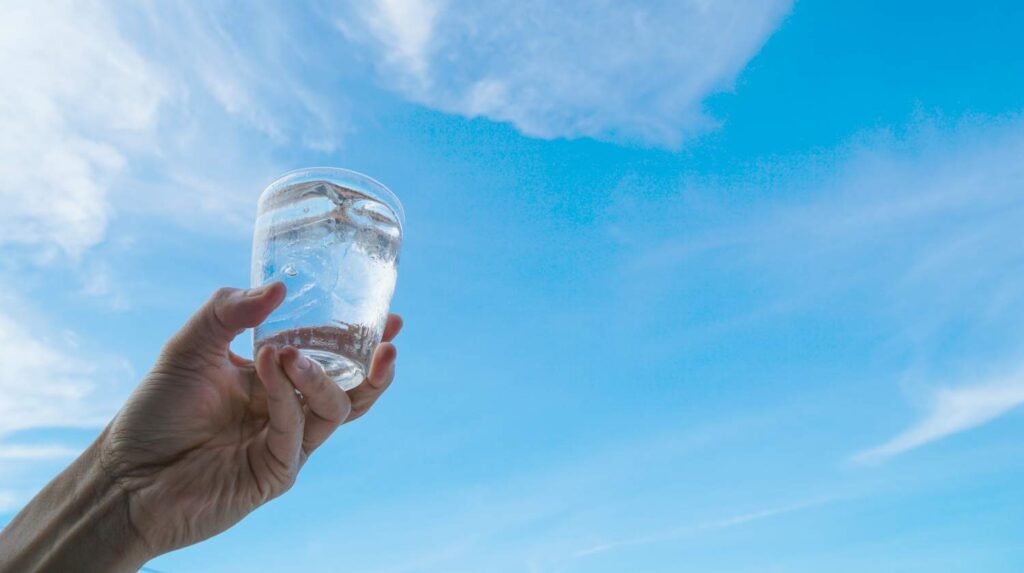Hydration: Why it’s so important!
The human body is made up for more than 50% water. Every cell in our body needs water to do it’s job. Water helps to regulate body temperature, keeps mucous membranes moist, skin soft, lubricates joints, prevents constipation, and maintains your metabolism.
Every day you lose water through your breath, perspiration, urine and bowel movements. For your body to function properly, you must replenish its water supply by consuming beverages and foods that contain water. As the temperatures rise, getting enough to drink is important whether you’re playing sports, traveling or just sitting in the sun. And it’s critical for your heart health. Keeping the body hydrated helps the heart more easily pump blood through the blood vessels to the muscles. And, it helps the muscles work efficiently.
What does being well hydrated mean?
The amount of water a person needs depends on physical activity, diet, and environmental factors such as air temperature and humidity. You’ve probably heard the advice to drink eight glasses of water a day. That’s easy to remember, and it’s a reasonable goal.
Most healthy people can stay hydrated by drinking water and other fluids whenever they feel thirsty. For some people, fewer than eight glasses a day might be enough. But other people might need more.
The amount of water a person needs depends on physical activity, diet, and environmental factors such as air temperature and humidity.
You might need to modify your total fluid intake based on several factors:
- Exercise. If you do any activity that makes you sweat, you need to drink extra water to cover the fluid loss. It’s important to drink water before, during and after a workout.
- Environment. Hot or humid weather can make you sweat and requires additional fluid. Dehydration also can occur at high altitudes.
- Overall health. Your body loses fluids when you have a fever, vomiting or diarrhea. Drink more water or follow a doctor’s recommendation to drink oral rehydration solutions. Other conditions that might require increased fluid intake include bladder infections and urinary tract stones.
A person who perspires heavily will need to drink more than someone who doesn’t. Certain medical conditions, such as diabetes or heart disease, may also mean you need to drink more water. People with cystic fibrosis have high concentrations of sodium in their sweat and also need to use caution to avoid dehydration. And some medications can act as diuretics, causing the body to lose more fluid.
How do I know if I’m dehydrated?
Some signs of dehydration include:
- Extreme thirst
- Headache
- Dry, irritated, itchy, or sensitive skin.
- Muscle cramps.
- Less frequent urination
- Dark-colored urine
- Fatigue
- Dizziness
- Confusion
What are some of the complications?
Dehydration can lead to serious complications, including:
- Heat injury. If you don’t drink enough fluids when you’re exercising vigorously and perspiring heavily, you may end up with a heat injury, ranging in severity from mild heat cramps to heat exhaustion or potentially life-threatening heatstroke.
- Urinary and kidney problems. Prolonged or repeated bouts of dehydration can cause urinary tract infections, kidney stones and even kidney failure.
- Seizures. Electrolytes — such as potassium and sodium — help carry electrical signals from cell to cell. If your electrolytes are out of balance, the normal electrical messages can become mixed up, which can lead to involuntary muscle contractions and sometimes to a loss of consciousness.
- Low blood volume shock (hypovolemic shock). This is one of the most serious, and sometimes life-threatening, complications of dehydration. It occurs when low blood volume causes a drop in blood pressure and a drop in the amount of oxygen in your body.
How can I prevent dehydration?
To prevent dehydration, drink plenty of fluids and eat foods high in water such as fruits and vegetables. Letting thirst be your guide is an adequate daily guideline for most healthy people.
It’s a good idea to drink a glass of water:
- With each meal and between meals
- Before, during and after exercise
- If you feel thirsty
Did you know that approximately 80 percent of our water intake comes from drinking water? The other 20 percent comes from food. All whole fruits and vegetables contain some water, but snack on these for maximum benefit: cucumbers, celery, tomatoes, radishes, peppers, cauliflower, watermelon, spinach, strawberries, broccoli, and grapefruit. They all contain 90 percent water or higher.
Stay safe, cool, and hydrated this summer. And remember, if you’re experiencing any symptoms of dehydration or heat stroke notify your health care provider immediately!
